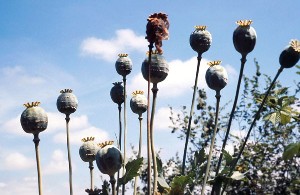As we reported last week, NATO top commander US Gen. John Craddock created a severe split inside the Western alliance by issuing a "guidance" -- the first step before issuing orders -- telling NATO commanders on the ground in Afghanistan he wanted their troops "to attack directly drug producers and facilities throughout Afghanistan." Now, NATO says, Craddock has retreated, and the original agreement that NATO troops would only attack drug traffickers linked to the Taliban and related insurgents has been restored.

Craddock's original "guidance" had caused heads to explode among the NATO command in Afghanistan, with ISAF commander David McKiernan claiming that Craddock was trying to create "a new category" within the rules of engagement and treading perilously close to violating the international law of war. McKiernan's boss, Egon Ramms, the German leader of the NATO Command in the Netherlands, which is currently in charge of the ISAF forces, shared that critique.
"The guidance provided up the chain from General Ramms and General McKiernan was accepted by General Craddock," Apparthurai said. "Everything that will be done at ISAF will be done fully in compliance with international law, with the laws of armed conflict, as well as national laws."
Combined NATO and US forces in Afghanistan number about 50,000, with President Obama pledging to increase that number by 20,000 to 30,000. They are caught on the horns of a dilemma when it comes to the opium traffic: Attempt to suppress it and risk driving farmers into the waiting arms of the Taliban, or instead ignore it, and allow the Taliban to reap hundreds of millions of dollars in opium profits, which it can use to buy shiny new weapons to shoot at NATO and US troops.
This work by StoptheDrugWar.org is licensed under Creative Commons Attribution-ShareAlike 4.0 International
Comments
Problematic
This article highlights one of the prime problems of our work in Afghanistan (And other places)... everything is so damned paradoxical. Even attempting to solve one problem creates a series of others, like playing some deadly game of whack-a-mole.
That's why its so frustrating to hear people (media, civilians, politicians) talk about things as if there is some partcular solution that makes sense... there isn't. If everyone, from the people who vote to the people who make policy, had a more holistic view of what was really going on over there, maybe we could all move forward in something like a useful way.
If you are interested in a more holistic view of what is going on "over there," I suggest reading "Don't Clean the Table with a floor mop, written by an old naval officer who spent a year mentoring the Afghan national army.
http://www.amazon.com/dp/1440493987?tag=hubp0448-20&camp=14573&creative=327641&linkCode=as1&creativeASIN=1440493987&adid=07Z2J73PK8KY114HMJNV&
Add new comment